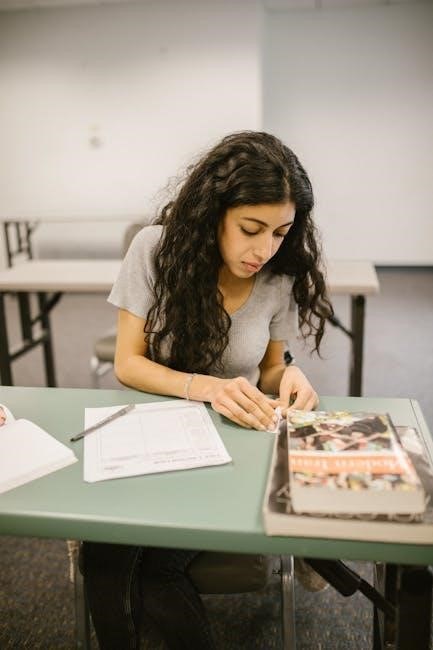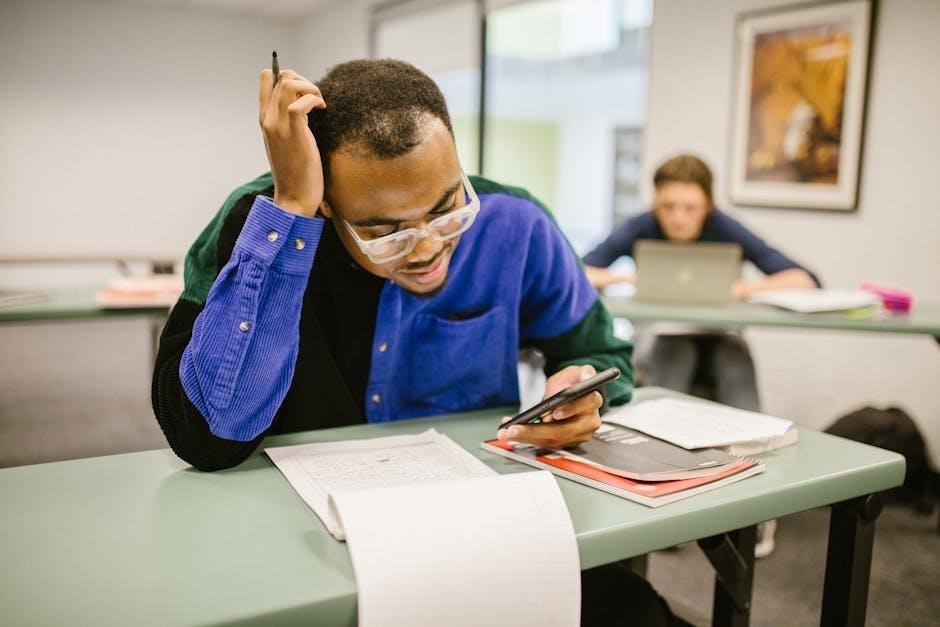Learning happens through relationships and experiences‚ guided by four foundational conditions‚ as outlined in the Ontario pedagogy for early years‚ supporting children’s growth and development effectively always.
An Overview of the Resource
The resource provides an introduction to the concept of how does learning happen‚ with a focus on the importance of relationships and experiences in the learning process. It is designed to support leaders in early years programs with their continuous professional learning‚ and highlights key information‚ examples‚ and questions from the Ontario pedagogy for the early years. The resource is organized in a way that is easy to follow‚ with clear headings and concise language‚ making it accessible to a wide range of readers. It also includes examples and case studies to illustrate the concepts and provide a deeper understanding of the material. Overall‚ the resource provides a comprehensive overview of the how does learning happen framework‚ and is a valuable tool for anyone working in early years education. The resource is available in a variety of formats‚ including pdf.

Foundational Conditions for Learning
Belonging‚ Well-Being‚ Engagement‚ and Expression are essential conditions for learning‚ as outlined in the Ontario pedagogy for early years‚ supporting children’s growth and development effectively always online.
Four Key Conditions for Children to Grow and Flourish
The four key conditions for children to grow and flourish are Belonging‚ Well-Being‚ Engagement‚ and Expression‚ which are essential for their overall development and learning.
These conditions are interconnected and interdependent‚ and they provide a foundation for children to thrive in their early years.
The condition of Belonging refers to the sense of security and comfort that children feel when they are in a nurturing environment‚ surrounded by caring adults and peers.
The condition of Well-Being refers to the physical‚ emotional‚ and mental health of children‚ which is critical for their overall development and learning.
The condition of Engagement refers to the ability of children to explore‚ discover‚ and learn about their environment‚ and to engage with others in meaningful ways.
The condition of Expression refers to the ability of children to communicate their thoughts‚ feelings‚ and ideas through various forms of expression‚ such as language‚ art‚ and music.
These four conditions are critical for children to grow and flourish‚ and they provide a foundation for their future success and well-being‚ as outlined in the Ontario pedagogy for early years‚ supporting children’s growth and development effectively always online.

Understanding Children‚ Families‚ and Educators
Children‚ families‚ and educators are interconnected‚ influencing each other’s lives and learning‚ as outlined in the Ontario pedagogy‚ supporting collaborative relationships and mutual understanding always effectively online.
A Shared View of Relationships
A shared view of relationships is essential in understanding how learning happens‚ as it recognizes the interconnectedness of children‚ families‚ and educators. This perspective acknowledges that relationships are a crucial factor in shaping the learning experience. The Ontario pedagogy for the early years emphasizes the importance of building strong‚ positive relationships between children‚ families‚ and educators. By fostering a sense of community and belonging‚ early years programs can create an environment that supports children’s social‚ emotional‚ and cognitive development. A shared view of relationships also recognizes the diversity of families and their experiences‚ and seeks to establish partnerships that are respectful and responsive to their needs. By working together‚ children‚ families‚ and educators can create a supportive and inclusive learning environment that promotes children’s overall well-being and success. This approach is critical in helping children develop a sense of identity and belonging.

Effective Practices in Early Years Programs
Early years programs emphasize positive relationships‚ play-based learning‚ and community engagement to support children’s development and well-being always effectively.
Emphasizing Positive Relationships
Emphasizing positive relationships is crucial in early years programs‚ as it helps children develop a sense of belonging and well-being. This is achieved through a shared view of children‚ families‚ and educators‚ where everyone works together to create a supportive environment. The Ontario pedagogy for the early years emphasizes the importance of relationships in learning and development. By fostering positive relationships‚ educators can help children build trust‚ confidence‚ and self-esteem. This‚ in turn‚ helps children to engage more fully in the learning process and to develop a love of learning that will last a lifetime. Effective practices in early years programs prioritize relationships and community engagement‚ recognizing that these are essential for children’s social‚ emotional‚ and cognitive development. By emphasizing positive relationships‚ educators can create a strong foundation for children’s future success and well-being. This approach is supported by research and is outlined in the how does learning happen pdf.

Using How Does Learning Happen as a Curriculum Framework
Guides educators in fostering children’s learning and development using Ontario’s pedagogy for early years effectively always with a curriculum framework.
Fostering Children’s Learning and Development
Using How Does Learning Happen as a curriculum framework helps educators foster children’s learning and development by creating a supportive and inclusive environment; This approach emphasizes the importance of relationships‚ play‚ and inquiry-based learning in shaping children’s experiences and outcomes. By focusing on the four foundational conditions of belonging‚ well-being‚ engagement‚ and expression‚ educators can design programs that promote children’s social‚ emotional‚ and cognitive development; The framework also encourages educators to reflect on their own practices and to work collaboratively with families and communities to support children’s learning and development. Overall‚ using How Does Learning Happen as a curriculum framework provides a comprehensive and child-centered approach to fostering children’s learning and development‚ and helps educators create high-quality early years programs that support the unique needs and abilities of each child. This approach is essential for promoting children’s overall well-being and success.
